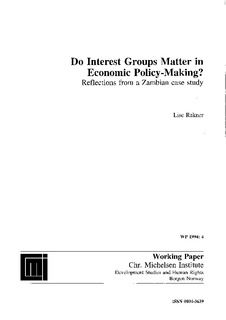Do Interest Groups Matter in Economic Policy-Making? Reflections from a Zambian case study
| dc.contributor.author | Rakner, Lise | |
| dc.date.accessioned | 2008-03-12T09:13:28Z | |
| dc.date.accessioned | 2017-03-29T09:12:33Z | |
| dc.date.available | 2008-03-12T09:13:28Z | |
| dc.date.available | 2017-03-29T09:12:33Z | |
| dc.date.issued | 1994 | |
| dc.identifier.issn | 0804-3639 | |
| dc.identifier.uri | http://hdl.handle.net/11250/2435866 | |
| dc.description.abstract | The current debate within development research strongly emphasise the role of interest groups in developing and sustaining democratic and liberal economic reforms. With this debate as its point of departure, the paper discusses to what extent interest groups actually matter in Sub- Saharan Africa. Did interest groups shape the former policies of the one-party regimes and are organised interests likely to respond to market-based economic reforms? Arguing that political institutions must ultimately be understood within each national historical context, the general discussion of the paper is illustrated with references to Zambia. The paper was originally presented at the conference "Democratisation in developing countries: Social, economic and political consequences", held at Chr. Michelsen Institute, 3-5 Februar 1994. | |
| dc.language.iso | eng | |
| dc.publisher | Chr. Michelsen Institute | |
| dc.relation.ispartofseries | CMI Working paper | |
| dc.relation.ispartofseries | WP 1994: 4 | |
| dc.subject | Democracy | |
| dc.subject | Economic reform | |
| dc.subject | Interest groups | |
| dc.subject | World Bank | |
| dc.subject | Zambia | |
| dc.title | Do Interest Groups Matter in Economic Policy-Making? Reflections from a Zambian case study | |
| dc.type | Working paper |
Tilhørende fil(er)
Denne innførselen finnes i følgende samling(er)
-
Bora-import [434]
